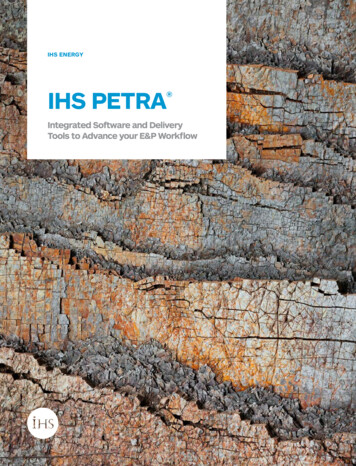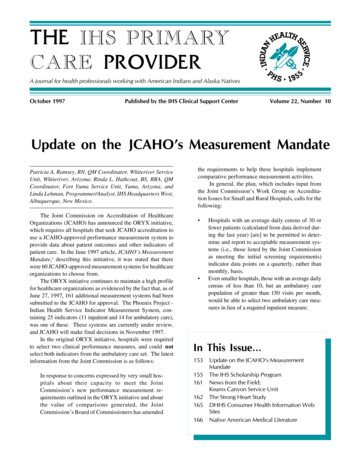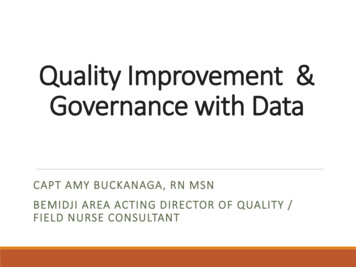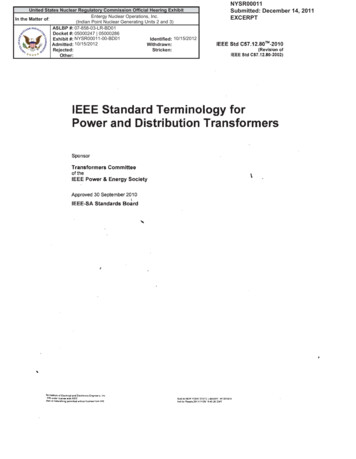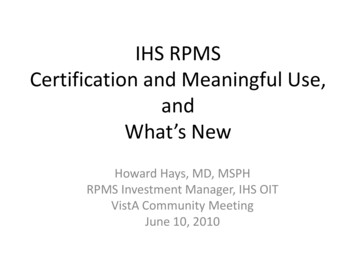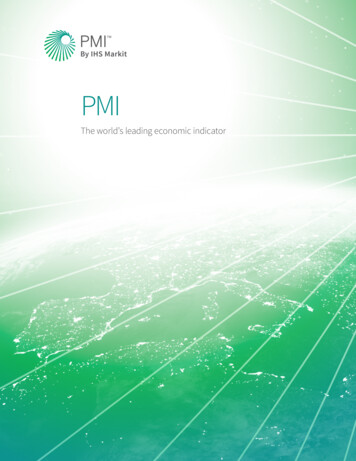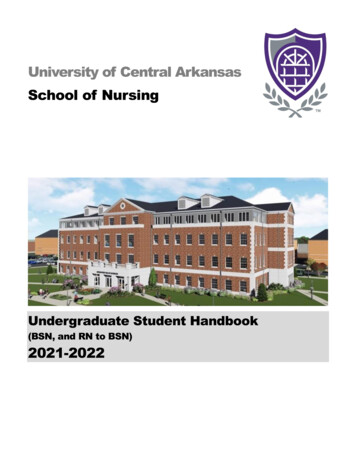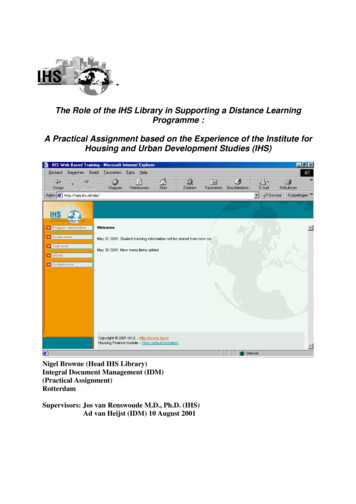
Transcription
The Role of the IHS Library in Supporting a Distance LearningProgramme :A Practical Assignment based on the Experience of the Institute forHousing and Urban Development Studies (IHS)Nigel Browne (Head IHS Library)Integral Document Management (IDM)(Practical Assignment)RotterdamSupervisors: Jos van Renswoude M.D., Ph.D. (IHS)Ad van Heijst (IDM) 10 August 2001
ContentsPageExecutive SummaryiiList of Figures and TablesiiiAbbreviationsivChapter 1: Introduction1Chapter 2: The IHS Context for Distance Learning4Chapter 3: Housing Finance Pilot Project9Chapter 4: The Role of Libraries in Distance Learning Programmes19Chapter 5: Building up an Information Architecture to Facilitate the TATEDistance Learning Programme at the IHS26Chapter 6: Copyright in the digital distance learning environment – issuesfor IHS to consider29Chapter 7: Conclusions and recommendations37Bibliography42AnnexesAnnex A: Original (tentative) Proposals45Annex B: The TATE (Technology-Assisted Training and Education)Programme proposal51Annex C: ScienceDirect Web editions – completed onlinelicense agreement59Annex D: ACRL Guidelines for Distance Learning Library Services63
Executive SummaryThis report is the final activity for the Integral Document Management (IDM) post-graduatecourse, and describes a practical assignment on what happened during a pilot project ondistance learning at the Institute for Housing and Urban Development Studies (IHS). Thefocus is on the future tasks and activities that the IHS library should develop in the context ofthe wider implementation of distance learning within the institute. Apart from providinggeneral background on the IHS, the report describes a pilot project on Housing Finance. Itthen looks ahead to the kind of support that the IHS library might need to establish for theinstitute’s Technology-Assisted Training and Education (TATE) Programme, a longer termdistance learning initiative. The conclusions and recommendations relate to the IHS ingeneral, to the Housing Finance pilot project, to the TATE Programme, and they reflect uponthe ramifications for the support to be offered by the IHS library. The report ends with a shortfinal conclusion that points towards the priority actions that need to be undertaken to enablethe IHS library to be able to fully support distance learning throughout the institute.ii
List of Figures and TablesList of FiguresFigure 3.1Figure 4.1Figure 4.2Figure 4.3Figure 4.4Structure of the “Course Room” in the Housing Finance DistanceLearning ModuleExample of an image selected from the IHS Image databaseBibliography on Housing Finance as provided by the IHS libraryHousing Finance Distance Learning Module Links pageA prototype electronic reserve on Housing FinanceList of TablesTable 2.1Table 3.1Table 3.2Table 3.3Table 3.4IHS Educational Programme 2002Composition of the Housing Finance (pilot project) project teamHousing Finance (pilot project) project team meetings, milestones/eventsand phasesOverview of hardware and software needed at IHS for the HousingFinance moduleStudents involved in the pilot test of the Housing Finance moduleiii
PhDTATEUMCVROMWBTAssociation of College and Research LibrariesFull-Time EquivalentInformation and Communication TechnologiesInternational Course on Housing and Urban DevelopmentIntegral Document ManagementInstitute for Housing and Urban Development StudiesLearning Content Management SystemLearning Management SystemMaster of ArtsMaster of ScienceOnline Public Access CatalogueDoctor of PhilosophyTechnology-Assisted Training and Education ProgrammeUrban Management CourseMinistry of Housing and Spatial PlanningWeb Based Trainingiv
Chapter 1: IntroductionMany organisations in the higher educational sector have spent a lot of time and energy inrecent years to develop distance learning or distance education programmes to enable theirinstitutes to compete in the international higher education market. The Institute for Housingand Urban Development Studies (IHS) is no exception to this trend. At the end of last year,IHS launched a distance learning pilot project on Housing Finance. This pilot project wasestablished to explore first hand, both the organisational inputs and the technical investmentsthat would be required during the implementation of a distance learning programme at theIHS.TopicThe Head of the IHS Library (the author) was also a member of the project team involved inthe Housing Finance distance learning pilot project. This report aims to describe whathappened during the pilot project, paying particular attention to defining the library’s(potential) role in the planned distance learning programme of the IHS, called theTechnology-Assisted Training and Education (TATE) Programme. The main issue being:What would be the functions and tasks of the IHS library in the context oforganisation’s proposed distance learning programme(s)?Report StructureAfter an introduction, this report has the following structure: Chapter 2 provides background on the IHS and its current educational programmes;Chapter 3 describes the Housing Finance pilot project;Chapter 4 discusses the general role of libraries in distance learning programmes and thecontribution of the IHS library to the Housing Finance Distance Learning pilot project inparticular;Chapter 5 explores the directions the IHS library might consider pursuing in order tofacilitate the implementation of distance learning within the organisation;Chapter 6 provides a brief overview of the main copyright issues relating to distancelearning in the context of IHS’s plans, andThe final chapter ends with some conclusions that have been drawn from the experiencesgained and gives some general recommendations for the organisation to consider, togetherwith some specific recommendations for the IHS library.OmissionsThree aspects included in the original tentative proposal have been left out as their scope wasconsidered by the author to be too wide for the purposes of the assignment.1. Learning Management System (LMS)As a decision was made at the very beginning of the pilot project not to opt for a particularLearning Management System (LMS), the author felt that the idea of undertaking acomparison of the various LMS packages would be premature at this stage. Recent1
publications in the popular scientific magazines, cited below would seem to confirm that sucha comparison of LMSs might be premature at this stage.Electronic learning platforms like WebCT and Blackboard have led to the creation of a wholenew computerised layer into the academic process that allows faculty to easily create at leastonline administrative structure for their courses, including varying levels of content fromtraditional publishers (Lichtenberg 2001)Another commentator has observed that LMSs (server based software that controls e-learningand needs and uses) are going through an uncertain phase. LSM standards are in flux, vendorsmay be facing a shakeout, and relatively few large companies to date have embracedenterprise-wide e-learning. The development of LMS market has been further hampered by alack of standards. The same author predicts that final LMS standards may take a year or twoto evolve, without there being a guarantee of any possible plug-and-play compatibility amongsystems. (Alexander 2001, p. 59) Alexander also indicated that the costs of LMS systemshave gone up fivefold in the past four years, with prices varying from US 20,000 to overUS 300,000.Learning Content Management System (LCMS)He also describes a next-generation LMS in development (Learning Content ManagementSystem (LCMS)), that will at the same time enhance both functionality and buyer confusion.Apart from delivering training, it would catalogue reusable segments of learning material,permitting segments to be mixed and matched to tailor learning for different audiences.(Alexander 2001, p. 60) Another author describes it as:“( ) a complex piece of software that labels learning objects (PowerPoint slides,video clips, illustrations, quiz questions, even course modules) then organises anddelivers them in infinite combinations.” (Jones 2001, p. 1)Jones goes on to argue that LMSs and LCMSs in fact have very different functions. Theformer make the process of scheduling classes, creating catalogues and registering learnersmore efficient, while LCMS on the other hand, are only about delivery. He expresses thedifference between the two systems in the following way:“”( ) the LMS helps get you to the classroom door and the LCMS manages theexperience inside the classroom.” (Jones 2001, p. 2)Although most LMSs can do some content management and most LCMSs do have someclassroom management capabilities, the feeling is that neither can do it all, but they rather doone or the other well. This may change in the future, but the current advice is to eitherincorporate both systems into an organisation’s e-learning strategies or to decide which one ismost important to the organisation. Jones describes a content rich commercial organisationthat needed to have its existing content converted and managed. A LCMS allowed them toreuse core online content in a tailored fashion for different clients. (Jones 2001, p. 2)The Housing Finance pilot project team took the decision to deliver distance learning basedon technology that had already been developed by Atos Origin. Even so, IHS will still need totake a decision on which LMS (or maybe LCMS) it wishes to adopt during the2
implementation of the distance learning programme within the institute. This decision shouldbe based on a separate study. It is, therefore, not within the scope of this report.2. Relational DatabasesAnother point that has also been dropped from the practical assignment is that of looking forexamples of the use of relational databases in distance learning programmes. Again it was feltalthough it was something that might need to be looked into in the future, this issue in factprovided little immediate information that would have be of short-term relevance to thesetting up of the proposed distance learning programme at the IHS.3. Urban Knowledge PlatformAn Urban Knowledge Platform, a virtual community of interest on urban issues currentlyunder development at IHS, may be able to provide important linkages for the TechnologyAssisted Training and Education (TATE) Programme. However, it was felt that it is now tooearly in the development of this Knowledge Platform to make any realistic predictions aboutpossible synergies.Original (tentative) ProposalsFor the sake of clarity both initial tentative project proposals compiled by the author at theend of last year and at the beginning of this year are included in Appendix A.3
Chapter 2: The IHS Context for Distance LearningThe IHS describes itself on its web page as follows:“IHS, or the Institute for Housing and Urban Development Studies, is aninternational education institute aiming at strengthening local capacities inhousing, urban management and urban environmental management, with theoverall objective to improve urban quality and reduce urban poverty. Each year,more than 150 professionals from all over the world come to Rotterdam to take partin one of our Diploma courses, Master Degree Programmes or to do a PhD study.Besides developing and conducting training and education programmes in theNetherlands, IHS is engaged in various advisory and technical assistance projectsabroad, for clients like the World Bank, Asian Development Bank, United Nationsand the European Union.” (http://www.ihs.nl/institute/institute.html)The IHS was established in 1958. The institute is an independent foundation which offersinternational post-graduate education (MSc, MA, PhD), training research and advisoryservices in the Netherlands, Asia, Africa, Latin America and Central and Eastern Europe inthe fields of Urban Management, Urban Environment and Housing. Over the years, more than4500 urban professionals from over 100 countries have participated in IHS Master’s degreeprogrammes, post-graduate diploma courses and its PhD programmes. IHS’ Master’s and PhDprogrammes are set up in conjunction with well-known European universities, as well as anAmerican university.The institute employs an international staff of around 50 experts: economists, planners,engineers, architects, sociologists, geographers and educationalists. These experts areassigned to training, advisory technical assistance and research in the Netherlands and abroad.The institute has over 20 support staff based in Rotterdam, including four library staff (2.4Full-Time Equivalent (FTE). In addition, there are 15 staff members working for IHS in Asia,Africa, Eastern Europe, Latin America and the Middle East. IHS maintains active contactwith other urban development research and development institutions all over the world.Education Programme in 2002IHS training ranges from short executive courses lasting 3½ weeks to degree courses of 17months duration.Short-term post-graduate courses include: Three-months courses 3½-weeks executive courses Industrial Environmental Management (6 weeks) Environmental Health and Hazardous Waste Management (3 weeks) Industrial Pollution Control and Management (3 weeks) Sustainable Building and Urban Design (8 weeks) Executive Summer Course of Inner City Revitalisation (2 weeks)The Master’s Programmes include:4
MA Urban ManagementMSc Urban Environmental ManagementMA Environmental Change ManagementMSc Urban Housing ManagementMSc Housing and Inner City RevitalisationOther training activities include tailor-made courses, refresher courses and PhD research.(Educational programme 2002 2001)The educational programme of IHS in 2002 includes the following courses:Course TypeShort Courses (3 months)Name of CourseMunicipal EnvironmentalPolicies and Local Agenda 21Capacity Building andTraining for UrbanDevelopmentManaging SustainableLivelihood and PovertyReduction ProgrammesManaging UrbanInfrastructure ServicesUrban Management: Planningand FinanceGood Urban Governance andPublic ManagementReal Estate and ProjectManagementInner City Revitalisation andUrban HeritageDuration of CourseStarting on:16 January 200216 January 200216 January 200217 April 200217 April 200217 April 200217 April 200217 April 2002Short Courses (3½ weeks)Innovation in Urban Policyand ManagementCapacity Building andTraining of TrainersLocal Policies for SustainableLivelihood ProgrammesManagement andImplementation of InformalSettlement RegularisationHousing Policy and FinanceParticipative Planning –Action and Strategic PlanningPublic Management forDevelopment and Change514 January 2002and again on15 April 200214 January 200214 January 200214 January 200214 January 200211 February 2002and again on13 May 200211 February 2002and again on13 May 2002
Urban Municipal Finance(three-week course)Other Short Courses(two-week course)(six-week course)(three-week course)(eight-week course)(three-week course)Master Courses(16-month course incollaboration with theErasmus University11 February 2002and again on13 May 200211 February 2002Local EconomicDevelopmentMunicipal Environmental11 February 2002Management : Policy Optionsand ToolsAdvanced Strategic Planning 11 March 2002and again on10 June 2002Successful Urban11 March 2002Partnerships – Public/Private and again on10 June 2002and Public/NGOAdvanced Public11 March 2002Managementand again on10 June 2002Advanced Urban Finance11 March 2002and again on10 June 2002Local Agenda 21 : Processes 11 March 2002and ParticipationManaging Urban15 April 2002Development in an Era ofAidsUrban Infrastructure :13 May 2002Operations ManagementUrban Infrastructure and the 10 June 2002Market : Finance andOrganisationLand Use Management10 June 2002Decentralised Housing10 June 2002ProvisionExecutive Summer Course onInner City RevitalisationIndustrial EnvironmentalManagementIndustrial Pollution Controland ManagementSustainable Building andUrban DesignEnvironmental Health andHazardous WasteManagement17 July 2002MA in Urban ManagementSeptember 2002611 September 200211 September 200218 September 20022 October 2002
Rotterdam)(17-month course incollaboration withWageningen University)(12-month course incollaboration with theErasmus UniversityRotterdam)(16-month course incollaboration with LundUniversity, Sweden)(16-month course incollaboration with theUniversity of Delaware)Other Courses(2-3 weeks)MSc in Urban Environmental September 2002ManagementMA in Environmental Change September 2002ManagementMSc in Urban HousingManagementSeptember 2002MSc in Housing and InnerCity RevitalisationSeptember 2002Tailor-made CoursesRefresher CoursesUpon request(usually through a local IHSAlumni organisation)PhD Research ProgrammeTable 2.1 IHS Educational Programme 2002The lecturers for these courses usually compile for each subject Readers/Course Packs that arecopied and handed out to the students. A copy of each Reader is also passed on to the IHSlibrary. There are no electronic versions of these readers that generally consist of photocopiesof journal articles, chapters from books and/or lecture notes/exercises.These courses have been described in the following terms:“(.) the training and educational activities of the Institute in Rotterdam can be dividedin 2 distinct categories; (i) short courses and (ii) masters’ courses. The short coursescomprise: a. regular short courses (usually 3 months in duration) on “classic” topicswithin the Institute’s area of expertise; b. tailor-made courses (courses put together onspecific, topic-related requests) and refresher courses. The masters’ courses are 16-18months in duration and are given in collaboration with universities and/or otherinstitutes for international education. All courses are currently given using proven,rather classic, interactive face-to-face teaching methods (i.e., classroom lecturing,group workshops, group field trips, etc.).” (Renswoude 2000, p. 1)Strategic Importance of Distance LearningAgainst the background of diminishing opportunities for overseas students to financeexpensive traditional courses given in Rotterdam, the IHS has been looking for innovativeways to increase the institute’s outreach in the global educational market. As was observed ina document submitted to the Ministry of Foreign Affairs:“( ) the global market for IHS’ educational products is probably much larger thanwhat is currently seen translated into numbers of students actually participating in theInstitute’s training and educational activities in Rotterdam.” (Renswoude 2000, p. 1)7
Technology-Assisted Training and Education (TATE) ProgrammeThe Technology-Assisted Training and Education (TATE) Programme aims to bring about aprocess whereby the traditional IHS training and education activities are made available in aformat that allows them to be taught as part of a comprehensive distance learning package toIHS’s overseas students. The full text of the original TATE proposal is given in Annex B.Tool for Change ManagementResearch by Khapova considered the positioning of the TATE programme within the IHSfrom the perspective of it being a tool for change management. (Khapova 2001) Her analysisdid not go into detail on how to transform existing content into a distance learning format,although she did concede that information would have to be presented briefly and clearly, butbe full content wise. (Khapova 2001, p. 52) It is here that Khapova may have underestimatedthe size of the task ahead. One of the assumptions of this paper is that at present the deliveryof distance learning cannot be limited just to the module itself, but additional informationsupport will be essential, be it in a traditional (printed) or electronic format. This is a supportrole that the IHS could contribute to, but it may also require the development of new skills forthe IHS content and support staff. This would be particularly true in the area of preparingReaders/Course Packs not only in print format, but standard, in an electronic format, tofacilitate use in the distance learning environment. More will be said on this later in thisreport.Pilot Project on Housing FinanceOne of the assumptions of the TATE programme proposal is that the IHS already has thetechnology and skills to implement a distance learning programme. In order to facilitate that,it was decided to initiate a pilot project on Housing Finance. This report describes theactivities of that pilot project and its ramifications for the library in particular, and for the IHSas a whole. The module Housing Finance in a Web Based Training (WBT) format is the firstmodule designed under the TATE Programme. The module is based on existing content usedas delivered in a classroom context at IHS. However, it has been adapted and revised for theon-line learning environment. The next chapter of this report will describe the HousingFinance pilot project.8
Chapter 3: Housing Finance Pilot ProjectThe TATE programme draws on special innovation subsidies from the Dutch Ministries ofVROM and Foreign Affairs (Development Co-operation). The programme started in early2001 and has a projected duration of two years. One of the first products of the TATEProgramme is the WBT module on Housing Finance, specifically supported by the Ministryof VROM. It was developed by a team of experts from the IHS, the Ministry of VROM andAtos Origin, an international private company specialising in electronic communication andbusiness.The topic of Housing Finance was chosen because there was more than just a Reader/CoursePack available. The involved IHS teaching staff had already drawn up guidelines (forstudents). (Baharoglu and Lindfield 2000) These guidelines were designed as trainingmaterial offering basic systems and analytical tools to identify the (housing finance) system tobe used in a particular context. The guidelines also included a selected bibliography (basedmainly on the Reader/Course Pack).The place of Housing Finance at IHSThe Housing Finance module is presently being taught in two Master Courses (UrbanHousing Management that started in September 2001 in the Housing and Inner CityRevitalisation Master Programme) as well as in several short IHS training courses.Aim of the ProjectAccording to the Project Handbook drawn up by the Project Manager the main objective ofthe Housing Finance pilot project was formulated as follows:“The deliverable aimed for will be a Web Based Training module called HousingFinance. This module will be based on an existing, mostly paper based IHS moduleHousing Finance. Due to financial constraints the most important starting-point of theproject is that the technical and graphical development of the WBT version of HousingFinance will be based on one of Origin’s formerly developed e-learning modules.Another important delivery will be the evaluation report after a period of extensivetesting and the implementation of the WBT module in the IHS technicalinfrastructure.” (Verhalle 2001, p. 6)Project OrganisationThe project had a Steering Committee consisting of a representative from the IHS (DeputyDirector), a representative from VROM (the financiers of the project) and a representativefrom Atos Origin (senior manager). Once the project handbook had been approved by theSteering Committee, the project team, that was responsible for the execution of the project,received a copy. The project team had the following team members:Project MembersProject ManagerInstructional DesignerParent OrganisationAtos OriginAtos Origin9
Operational Co-ordinatorContent ExpertsEditor Cultural IssuesTechnical SpecialistTechnical SpecialistGraphic Composer [Designer]Team MemberTeam MemberIHSIHSIHSAtos OriginIHSAtos OriginVROMIHS libraryTable 3.1 Composition of the Housing Finance (pilot project) project teamThe Project Handbook as compiled by the project manager did not define specific roles foreither the VROM team member or the IHS library team member. The VROM team memberwas present to represent the interests of the financier of the pilot project. The library teammember used the project to find out what tasks and responsibilities the IHS library might needto develop in order to support the proposed IHS distance learning programme (the subject ofthis report). The Project Manager was the only member of the project team who met with theproject Steering Committee. Project team meeting dates are given in the table below alongwith significant milestones/events in the project and an indication of the timing of the mainproject phases.Date of Project TeamMeeting1 December 2000: a. Kick OffMeeting20 December 2000: 1st ProjectTeam Meeting10 January 2001: 2nd ProjectTeam Meeting24 January 2001: 3rd ProjectTeam Meeting7 February 2001: 4th ProjectTeam Meeting21 March 2001: 5th ProjectTeam Meeting4 April 2001: 6th Project TeamMeeting18 April 2001: 7th ProjectTeam MeetingMilestones/Events in theProject PhasesProject- Official Start of the Pilot Project (Phase 0 Preparation)(all interested parties attended)- Project Handbook in preparation (Phase 1 Analysis)(Project Manager)- Project Handbook approved bySteering Committee- Report on IHS TechnicalInfrastructure completed by ITdepartment of IHS- General Educational Analysiscompleted(Phase 2 Design)- IHS Operational Co-ordinatorleft IHS as of 1 April- Instructional Design Completed- Atos Origin Project ManagerReplaced- IHS (primary) Housing Finance (Phase 3 Realisation)Content Expert left IHS as of 1May9 May 2001: 8th Project TeamMeeting16 May 2001: 9th Project TeamMeeting30 May 2001: 10th Project- Pilot Test 28 May – 8 June 2001 (Phase 4 Test and10
Team Meeting13 June 2001: Project Team(Preliminary) Evaluation- Final pilot project evaluationreport (awaited)Acceptance)(Phase 5 Evaluation)Table 3.2 Housing Finance (pilot project) project team meetings,milestones/events and phasesTechnical RequirementsThe graphical and technical design of the WBT and the LMS it was assumed should be basedon a so-called “low” configuration:o Processor: P166 MMXo Internal memory: 16MB (32MB recommended)o Video board: 2MB (maximal resolution 800x600 and 256 colours)o Internet Explorer or Netscape Navigator, version 4.x or higher (during the pilottest the specification read Internet Explorer, version 5 or higher)o Flash 5 plugin (not used in the pilot test)o Win 95/98/ME/NT/2000o Modem 28k8 or more (56k recommended) or intranet facilities withconnection to the internetOptional:o CD-ROM player: 8x speed (16x speed recommended).o 16 bits audio board (SoundBlaster or a compatible board).Review of IHS Technical InfrastructureThis culminated in a short report by the head of the IHS IT department. (Santen 2001) Thatreport concluded that the major disadvantages of the LMSs WebCT and Blackboard werethat: It is not possible to separate the course from the content You cannot use your own interface for the courseIHS was interested in an LMS that was capable doing the former, to allow greater flexibility.IHS purchased a separate Windows NT server and additional devices and software. The tablebelow, as specified in the above mentioned report, gives an overview of the initial technicalinfrastructure needed for implementation of distance learning at IHS.ProductWindows NT ServerWindows NT workstationDigital video cameraCapturecardAdobe PremiereAdobe PhotoshopMacromedia DreamweaverUltradevMacromedia FlashMicrosoft SQL ServerCostfl 15.000,fl 7.000,fl 10.000,fl sYesflflOrderedOrdered11975,1.000,-
Slide scannerAudio encoderWebCTVarious hardwarefl 3.000,not known yetYes-fl 2.500,-Yesfl 2.500,--Table 3.3 Overview of hardware and software needed at IHS for the HousingFinance moduleEducational Analysis and Instructional DesignFrom the outset of the project a considerable amount of time went into the EducationalAnalysis and the Instructional Design processes using content available from IHS. Indeed themajority of the project meetings were about the progress (or lack of it) of these two relatedactivities. A complicating factor was the limited availability of IHS content experts (eitherthrough overseas missions and/or teaching obligations). This meant that it was difficult for theEducational Designer from Atos Origin to have sufficient time with the IHS content experts todiscuss and develop a learning model for the module. In addition, there was a need to developsome further background material to illustrate some of the concepts under consideration. Oneof IHS content experts supervised a student to look for this material on the Internet. Thebiggest problem being that neither the Atos Origin Educational Designer nor the IHS student,were native English speakers. This situation was complicated by the abrupt departure of themain IHS content expert before all the material had been properly processed. The biggestbarrier being not so much the technology involved, but the English of those assembling thecontent. Clearly there is a need in this project process for someone to have the final say, notonly on the content side, but also on the quality of the English used. All this meant that thetime allocations for the Educational Analysis and Design activities went well beyond whathad originally been budgeted for.ConstraintsThe following constraints has been identified from the beginning of the project: housing finance experts at IHS will not always be available for feedback duringproject team meetingsIHS technical infrastructure (poor Internet provision that was not expected to improvein the short-term) although alternatives, such as through the Erasmus University werebeing investigatedIHS has a limited server capacity (in order to run an LMS other than WebCT orBlackboard (these LMS run via an external server) new hardware needs to bepurchasedWebCT and Blackboard limit the developer to tailor the user interface of the WBTmodule Housing Finance (an alternative such as Lotus Learning Space 4 could beexplored) (Verhalle 2001,
course, and describes a practical assignment on what happened during a pilot project on distance learning at the Institute for Housing and Urban Development Studies (IHS). The focus is on the future tasks and activities that the IHS library should develop in the context of the wider implementation of distance learning within the institute.


